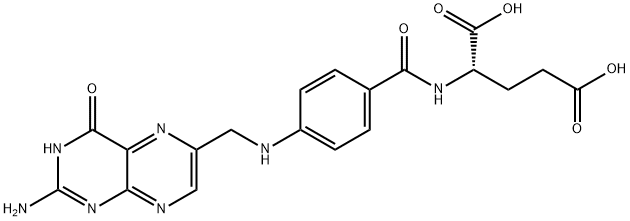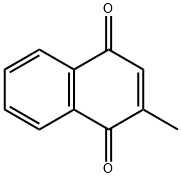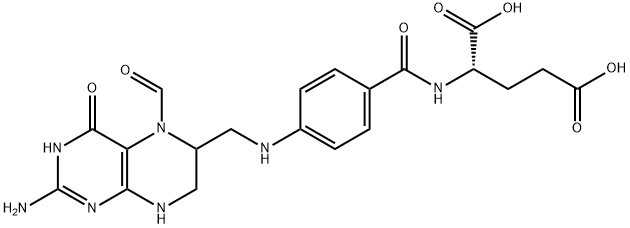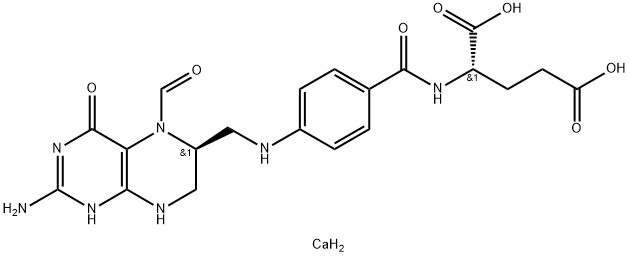Folic acid , Used for plant cell culture, ≥97% , 59-30-3
Synonym(s):
Folic acid;Cyanocobalamin;Vitamin M;Pteroylglutamic acid;Pterylmonoglutamic acid
CAS NO.:59-30-3
Empirical Formula: C19H19N7O6
Molecular Weight: 441.4
MDL number: MFCD00079305
EINECS: 200-419-0
| Pack Size | Price | Stock | Quantity |
| 5G | RMB111.20 | In Stock |
|
| 25g | RMB453.60 | In Stock |
|
| 100g | RMB1352.80 | In Stock |
|
| others | Enquire |
PRODUCT Properties
| Melting point: | 250 °C |
| alpha | 20 º (c=1, 0.1N NaOH) |
| Boiling point: | 552.35°C (rough estimate) |
| Density | 1.4704 (rough estimate) |
| bulk density | 110kg/m3 |
| refractive index | 1.6800 (estimate) |
| storage temp. | 2-8°C |
| solubility | boiling water: soluble1% |
| form | Crystalline Powder |
| pka | pKa 2.5 (Uncertain) |
| color | Yellow to orange |
| Odor | Odorless |
| PH Range | 4 |
| PH | 4.0-4.8 (25°C, 100g/L in H2O) |
| biological source | synthetic (organic) |
| Water Solubility | 1.6 mg/L (25 ºC) |
| Merck | 14,4221 |
| BRN | 100781 |
| BCS Class | 3 |
| Stability: | Stable. Incompatible with heavy metal ions, strong oxidizing agents, strong reducing agents. Solutions may be light and heat sensitive. |
| InChIKey | OVBPIULPVIDEAO-LBPRGKRZSA-N |
| LogP | -0.990 (est) |
| CAS DataBase Reference | 59-30-3(CAS DataBase Reference) |
| NIST Chemistry Reference | Folic acid(59-30-3) |
| EPA Substance Registry System | L-Glutamic acid, N-[4-[[(2-amino-3,4-dihydro-4-oxo-6-pteridinyl)methyl]amino]benzoyl]- (59-30-3) |
Description and Uses
Folic acid is an essential B vitamin. It is converted to folate in vivo, which is a necessary cofactor for a variety of biological processes, including nucleotide synthesis and, thus, DNA synthesis and repair, among others. A deficiency in dietary folic acid can lead to a range of developmental and cognitive disorders, most prominently neural tube defects and congenital heart defects.
folic acid is generally used as an emollient. In vitro and in vivo skin studies now indicate its capacity to aid in DnA synthesis and repair, promote cellular turnover, reduce wrinkles, and promote skin firmness. There is some indication that folic acid may also protect DnA from uV-induced damage. Folic acid is a member of the vitamin B complex and is naturally occurring in leafy greens.
Safety
| Symbol(GHS) |  GHS07 |
| Signal word | Warning |
| Hazard statements | H315-H319-H335 |
| Precautionary statements | P261-P305+P351+P338 |
| Risk Statements | 33-62-68 |
| Safety Statements | 24/25 |
| WGK Germany | 1 |
| RTECS | LP5425000 |
| F | 8 |
| TSCA | Yes |
| HS Code | 29362900 |
| Hazardous Substances Data | 59-30-3(Hazardous Substances Data) |
| Toxicity | A water soluble vitamin required in the diet of mammals. Sulfonamide drugs are selectively toxic to bacteria because they inhibit the incorporation of p-aminobenzoic acid into folic acid, a biosynthetic process in bacteria. Folic acid deficiency adversely affects prenatal development in humans. Dietary supplementation with folic acid dramatically reduces the incidence of neural tube defects in humans. Folic acid deficiency may also contribute to the causes of megaloblastic macrocytic anemia and a consequence of this is that this disease can be induced, as a side effect, when methotrexate, a folic acid antagonist, is used in cancer chemotherapy |




